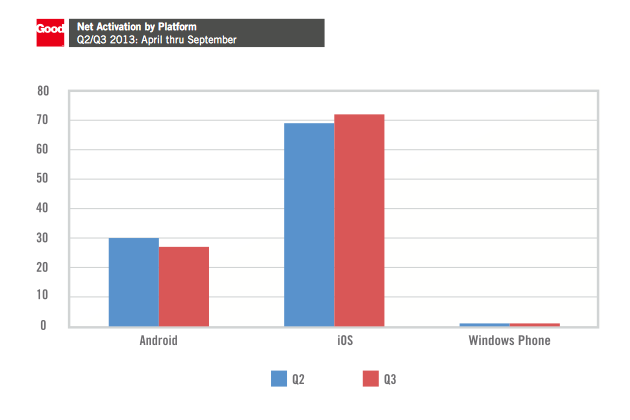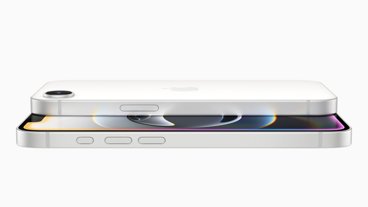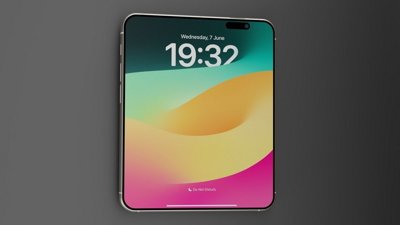Good Technology is "stealthily stealing BlackBerry's enterprise clients with a simple pitch" that offers companies a secure path to accommodate Bring Your Own Device policies, a movement that has ushered Apple into corporate markets.
A report by Kayla Tausche for CNBC profiled Good's facilitation of BYOB, noting the company's plans to promote the idea that "BlackBerry is no Good."
Major banks, including Morgan Stanley, Bank of America, Credit Suisse and JPMorgan Chase, as well as some of the largest healthcare organizations, have adopted Good's platform, enabling them to "ditch their ancient BlackBerry."
Good's chief executive Christy Wyatt has previously worked for Apple, Palm, Google and Motorola. In 2006, Motorola acquired Good for $400 million in an attempt to compete more directly with RIM and its popular BlackBerry Enterprise Server. Two years later, Motorola sold Good to a push email provider at a steep discount. Google later announced plans to purchase Motorola Mobility in late 2011.
Since then, Good has developed its business around supporting and securing mobile devices from Windows to Android and iOS. The company's quarterly metrics indicate that its clients are not interested in Windows Phone and that adoption of Android is slipping, while Apple's iOS now accounts for 72 percent of all mobile device activations in Q3.
Good also reported that iOS accounts for the majority of mobile phones and that iPads make up 90 percent of mobile tablets used in the enterprise by the firm's clients.
The company also noted, "iOS dominates as platform of choice for enterprise app deployment, with 98 percent and 95 percent of total app activations in Q2 and Q3 respectively."
Good is in the headlines now as the company eyes making an Initial Public Offering, and as BlackBerry continues its decline.
"We've actually grown our active users by 50 percent within the last three quarters," Wyatt stated.
 Daniel Eran Dilger
Daniel Eran Dilger







-m.jpg)






 Malcolm Owen
Malcolm Owen
 Bon Adamson
Bon Adamson
 Marko Zivkovic
Marko Zivkovic
 Amber Neely
Amber Neely



 Christine McKee
Christine McKee

-m.jpg)






21 Comments
Somebody tell the White House. Honestly, it's embarrassing to see our president still stuck in the technology of yesteryear. A non-U.S. one at that. What kind of message does that send to the world?
Can anyone figure out what their product actually is? This article doesn't say anything, the source doesn't say anything, the Wikipedia page looks like it was written by the company and doesn't say anything either...
edit: Moments after posting this I managed to find details at http://www1.good.com/good-dynamics-platform/. It's a combination of remote management tools, app "containerization" (as far as I can see this is essentially sandboxing), an enterprise app store and some analytic / management tools.
@darklite Yes, you need to read some more about Good Technology. This company has been in the news for several years so you must be new to mobile device management (MDM). Good does more than just sandboxing, it creates a separate encrypted data environment for managed users. This makes BYOD possible for corporate and government installations. The user can only connect to corporate resources through the Good client and if the user leaves the job, it's easy to purge the corporate data without messing up the phone.
At my work me have just ditched Blackberry and replaced with Good. It allows the normal Blackberry type function of having access to your Office based MS Outlook emails, appointments and contacts. So far I have been happy with the look on the screen, apart from too much red colouring. Our IT people said they dropped Blackberry due to the increased costs of licensing and lack of security. With Good I have to log in with a password every time I use it which was never required with my Office Blackberry.
This is another area where RIM not only missed the boat but failed to see the droves of people queued up to get on. They already had infrastructure in place with the many Blackberry Enterprise Servers installed at company sites around the world. They were so intent on protecting their brand they did not dare to admit other devices onto their platform. Had they been more device-agnostic they could have trumped Good and even Microsoft. As it is, the Good suite of products now admits all comers and is so, well, good it has even prompted some companies to drop Microsoft's ActiveSync in favor of Good for some purposes.